Enter content here We've Run Out of Tears... vMacedonia "I am 25, and my baby is 8 months old... I've been unable to bathe the baby for days! We can't sleep... I was told that they burned our crops, if we go back home now, we won't have any bread to eat. Reportage - among the refugees from Arachinovo.
More than two weeks have passed since the Macedonians from Arachinovo and Brnjarci left their homes. They are now residing in student dormitories. Their eyes tell you they are fed up with everything. They all think in the same way. For them, returning means fear. Coexistence does not exist. Life does not exist. They don't believe this state anymore.
By Marina Domazetovska
My baby wakes up in the middle of the night and suddenly shouts: 'Let's go home!' Home, where is home, my son?" - a woman whispers coming down the stairs in the Student Dormitory "Zdravko Cvetkovski". She has left her home in Arachinovo two weeks ago and is temporarily placed in the dormitory, together with her husband and her children:
"I am 35. Can you see my hands? They are like that because I've worked hard in order to live I have started from the fields and have made it to offer my children education, but now - there's no life. They said: 'You have 15 minutes to move' I was in Arachinovo, I returned several times, to see my house, but they were shooting at us, they were shooting in our backyard We had to escape. We're here now, these people have offered us place for living. But we will have to return to our homes one day. Who can promise us that it will be peaceful, so that we can return? We have left all we'd had in Arachinovo, all we had been working hard for. I sell fruit and vegetables on the green market, but it's all destroyed now, everything has been burnt...They have burnt the grains, too, what are we going to do now? We have come here with no clothes at all, where shall we go? My two children must go to school. I have two children. My little girl is at the fifth grade and my boy is at the sixth".
There are no tears in her eyes: "We've been crying for days and nights, we've run out of tears I can't understand what kind of a state is this! Healthy people we once were, we've all become deranged now!" 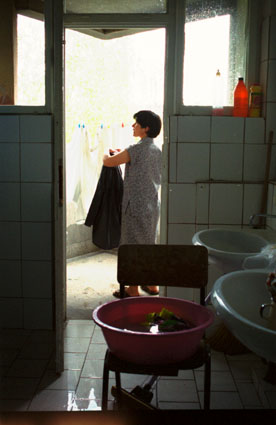 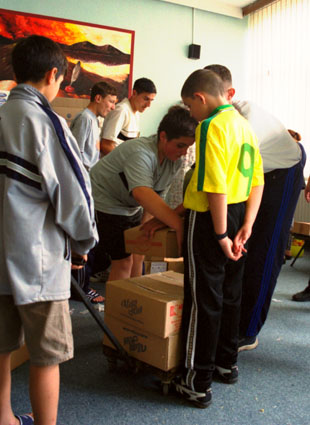 Life in the dorm "Zdravko Cvetkovski:" "These people at least found a place for us to stay..." In the hall of the dormitory where we had our conversation, a young mother came with her baby in her hands. You should not ask these people how they feel or how they felt before. You don't need to ask them anything. It is enough just to look at them and you see everything. Their looks say it all. They can't remain silent anymore:" I am 25, my baby is eight months old. How can I flee with her? It hasn't been bathed for days. She has not even slept as she should. There's a lot of noise here, there are children, they shout, they want to play. My husband is here, too. We were staying with some friends and relatives, but we can't stay there forever. Where can we go? We've been told that our grains have been burnt, we won't have money for food if we return now. "
"There was no police or anything in Arachinovo. How could they let it happen? Cars full of men used to come; there wasn't any policeman to stop them. They moved their wives with tractors on time. They were prepared for anything. Nobody told us anything. If we hadn't seen them, what they did, we would have stayed there and would get slaughtered alive. They give us everything here, and it would be a great sin if anybody says we're missing anything. But we're not at home! Nobody has come to see us since we are here. Does it mean that since we are Macedonians, we can bear anything? It's a shame!" 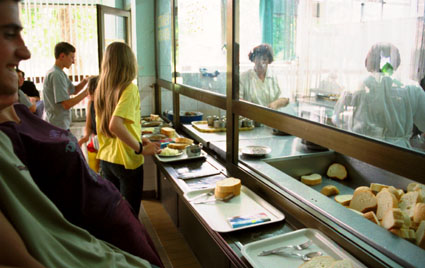 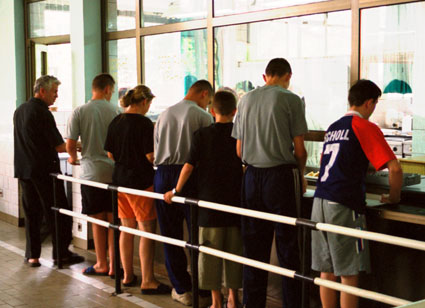 Lunch time in the commons of the dorm. She doesn't want to speak anymore. She just looks at my eyes and cries. The feeling I have is disgusting. The first thing that falls on your mind is - what if it all happened to me? What if I have to flee from my house? Where shall I go? You should not cry with them. They don't need condolence. They need help! Too many citizens have arrived in the dormitory already. They bring them clothes, food, whatever people find. An elderly woman has made a pie. She is hardly walking, but has arrived alone and is giving the pie to the children running around the yard. She stands for a brief rest, looks at them and cries.
Before visiting the Macedonian refugees in the "Zdravko Cvetkovski" dormitory, we thought that all they wanted was to return home. Tere are 360 persons there. They all think in the same way. For them, returning means fear. Coexistence does not exist. Life does not exist. They don't believe this state anymore:
"We had no problems with the Albanians before. I have been working on Bit-Pazar [a Skopje market situated in a neighborhood predominantly settled with ethnic Albanian population - a note of the translator], and nobody has said anything for so many years. It almost felt like I was more despised by Macedonians than by Albanians. I don't know where did this all come from. This is a miracle. We watched it on TV, when the conflicts started, and thought it would never happen to us. All of a sudden, we saw how they started moving. We thought that their relatives who had come from Kosovo were returning home. But when they started chasing us, we understood that there was a disaster going on there. But, OK, we'll forgive them, we want to return.
But I don't know what kind of a life we shall have there. How will I live in my house with the children, when I will be scared all the time! Your closest neighbor chases you: he waits for you to gather your children so that you can leave. What kind of a future shall we have if we return there? They are all from Arachinovo, don't let them lie to you when they say they are from Kosovo, they were our neighbors, we recognized them, we had lived together. My best man's wife was in Arachinovo, she said that she had seen my neighbor dressed in a uniform, with his hands in the air with a rifle, shouting "UÇK!" Albanians say there should be no Macedonians in Arachinovo, that it is their territory. I will not give away my land because I haven't got it from this government; I have worked for all I have, day and night. I have worked hard to achieve something, we have worked one way, they have worked another way, all of us have been doing our best, but look what we've come to. People are chased from their homes! Grab the children and run!" 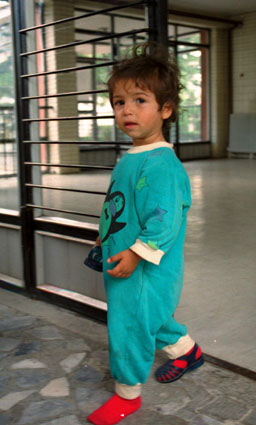 On the first day in the "Dimitar Vlahov" dorm: a child from Gajre. After lunch, some children came to the hall. They see their parents speak about the life in Arachinovo and just grin. If you ask them how they feel in the dormitory, they will say: "Great! Don't you see?" They sat with us for a moment, just to tell us how they wanted to go home, to school that they want their certificates that they still haven't been given. But, most important, they will tell you how they don't want to continue their education in Arachinovo. The girls were harassed in the busses. It's OK that we the boys fight each other but it's a shame to harass girls. We still haven't got our certificates this year. I want to go home, I don't want to stay here anymore!
From the "Zdravko Cvetkovski" dormitory we went to visit other places where displaced people are situated. The picture was not different at all. At the entrance of the dormitory "Dimitar Vlahov" a family from Brnjarci was waiting. A mother was sitting in the grass with her five months old baby. When we approached in order to talk to them, the baby's brother ran out of the dormitory, eyes full of tears. He stood a couple of steps away and gathered stones, which he wanted to throw at us. His mother ran to him to prevent him from doing that and told him we didn't want to harm: "He is protecting his brother. He is scared that you might seize him. That's how children live through this war" 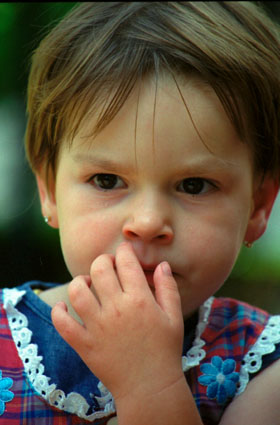 A girl from Brnjarci: How do children live through the war? ...And We Used to Live Well With the Albanians! vMacedonia 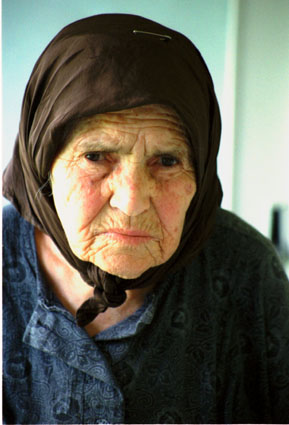 I am 77 years old. I was born in Viniche and have moved to Brnjarci as a bride, in 1946. I have three daughters and a son. I have lived well with the family. Life was good, I've had children and grandchildren. After that, my husband died, and now I am so sorry for the children. My grandson came to see me yesterday; it was such a relief to see his face.
I was with my daughter when we had to move out of Brnjarci, when my daughter in law came and said that we had to flee, that all refugees are placed in dormitories. I said OK, if that is necessary. My daughter was here just a minute before you came; she keeps on making me cry. Dear daughter, I tell her, why do you always do this to me?
We are well here now What can we do, when we have no other choice... The food is good we have hot water, everything. But we're not at home. We long for what's ours. We have built our house with our own hands, my husband and I. We had nothing else, just two pairs of hands. My husband and I, we worked in the field and if you could only see what a house we have built! And now, we had to come here, but what can we do The children from Brnjarci came here yesterday, they say it is not so bad there, but they don't tell us everything. They won't tell us. Everybody is standing guard, every night. There is one boy, he is a soldier, when he comes here I ask him what's up in the village, but he won't say anything, anything.
We have never had problems with Albanians. I was a girl in Viniche, I have worked in the field in Brnjarci, these villages are divided by a furrow only. We had no problems with Albanians at all. I used to wake up at three o'clock in the morning, put the baskets on the donkey or the horse and used to go gathering tobacco. I used to pass by their fields, they would take a look at me and continue with their work. They have never told me anything bad. When I was a little girl, my father would let me go for water riding on a donkey. There was an Albanian by the drain when I would reach it, always. I would call him; he would take me down from the donkey, pour water in my vessel and put me on the donkey's back again. We had no problem. But we have a lot of problems with the people from Arachinovo nowadays. A lot of people have gathered in Arachinovo. I don't even know where they are from anymore. Macedonia introduces war tax. Reuters SKOPJE, June 30 (Reuters) - Macedonia's government has introduced a war tax to cover a widening budget deficit caused by the worsening security situation in the country, the state MIA news agency said on Saturday.
Macedonia, one of the poorest states in Europe, has been fighting an ethnic Albanian rebellion for over four months and has recently spent large amounts of money buying modern weaponry.
MIA said the move, endorsed by parliament, provided that all non-cash transactions by legal entities and individuals would be taxed by 0.5 percent. The amount was one percent for cash payments.
The tax covered all domestic and foreign legal entities and individuals as well as non-government organisations.
Exempt were state organisations, municipalities, NATO and its KFOR-peacekeeping force in Kosovo which has logistical bases in Macedonia, as well as Macedonia's Red Cross and embassies.
The tax goes into effect on Sunday and extends to the end of the year. It is supposed to bring to the state coffers about 2.3 billion denars ($30 million), MIA said. How America forced Yugoslavia to trade in its most lucrative asset. The Independent By Andrew Buncombe and Vesna Peric Zimonjic
30 June 2001
Justice, honesty, the rule of law and order and, of course, lots of money.
The decision to hand over Slobodan Milosevic to be tried for war crimes had more to do with the prospect of massive aid payments than it did with an overwhelming desire among his countrymen to deal with the former dictator.
That much became clear yesterday at a donors' conference in Brussels where 44 nations donated a total of $1.28bn (£0.9bn) to help to rebuild Yugoslavia after 13 years of Mr Milosevic's rule.
"We did it. Now it's your turn," Yugoslavia's Deputy Prime Minister, Miroljub Labus, told the conference in a clear reference to the handover of Mr Milosevic. "We promised a clear cut-off from the past. We are on that way."
The European Commission pledged $445m (£315m) in addition to pledges from member states and the United States' $182m (£129m). The World Bank promised $150 (£106m) and Switzerland $22m (£16m).
At a meeting in Washington last month, the US Secretary of State, Colin Powell, told the Yugoslav President, Vojislav Kostunica, that America would boycott yesterday's conference if Mr Milosevic was not handed over. Mr Powell spoke twice in the past week with the Serbian Prime Minister, Zoran Djindjic, reiterating that message, and Mr Djindjic spoke with William Montgomery, the US ambassador, on Tuesday.
The final decision to hand over Mr Milosevic to the international body was not, however, made until late on Wednesday evening at a meeting of the DOS the government alliance. The only group to abstain was the Democratic Party of Serbia, led by Mr Kostunica, who was opposed to the handover. Just hours after the meeting, Mr Powell announced that America would attend the donors' meeting.
Serbia had little option but to do whatever was needed to ensure the promise of aid. After 13 years of Mr Milosevic's economic mismanagement, Nato sanctions and the 78-day bombing campaign of 1999, the country currently suffers from an inflation rate of 150 per cent. Unemployment stands at about 50 per cent, while foreign debt is estimated to be $12bn (£8.5bn). That Serbia was "economically blackmailed" was not lost on observers.
Aleksa Djilas, a Belgrade historian, told The New York Times: "We sold him for money and we won't really get very much money for it. The US is the natural leader of the world, but how [does it] lead? This just feeds the worst American instincts, reinforcing this bullying mentality."
Johannes Linn, the World Bank president, said the organisation would give priority to helping Yugoslavia balance its budget, rebuild energy networks and clear the Danube of wreckage left over by the Nato bombing, as well as focusing on reconstruction and social programmes. Serb backlash at Milosevic extradition. the Independent By Vesna Peric Zimonjic in Belgrade and Stephen Castle in The Hague
30 June 2001
The extradition of Slobodan Milosevic threw Yugoslavia into political chaos yesterday, after the federal government resigned in protest and thousands of pro-Milosevic demonstrators took to the streets of Belgrade.
Mr Milosevic has been indicted for crimes against humanity and violations of the wars or customs of war and already faces a maximum sentence of life in prison. Britain reiterated yesterday there was "a distinct possibility" that Mr Milosevic, if convicted, could serve his sentence in this country, one of eight that have agreed to take prisoners from The Hague.
In Belgrade, the federal Prime Minister, Zoran Zizic, quit, blaming what he called the "hasty and tactless decision" of the government of Serbia (one of two republics in the federation) to extradite Mr Milosevic. The resignation triggered the collapse of the cabinet, made up of reformists from the Democratic Opposition of Serbia (DOS) and ministers from Montenegro, Serbia's partner in the federation. The coalition has been in place since last September's federal elections.
The Yugoslav President, Vojislav Kostunica, will try to form a new government after consultations with parties when parliament meets on Monday.
At the same time, some 10,000 supporters of Mr Milosevic, many of them members of the ultra-nationalist Serbian Radical Party led by Vojislav Seselj, massed in central Belgrade to denounce the extradition. Last night they appeared to be dispersing peacefully.
The political drama raised fears of a feud emerging between President Kostunica, who has always opposed the Hague tribunal, and Serbia's pro-Western Prime Minister, Zoran Djindjic, who engineered Mr Milosevic's surprise removal to the Netherlands.
The crisis came as war crimes prosecutors in The Hague lodged fresh charges against Mr Milosevic for the Serbian police's reign of terror in Kosovo in 1999.
The arrival of the former president of Yugoslavia delighted the UN war crimes tribunal, where officials argued that the net was now tightening around other suspected war criminals, including Radovan Karadzic, the former Bosnian Serb leader, and his military leader, General Ratko Mladic. Carla Del Ponte, the tribunal's chief prosecutor, pledged to devote "renewed energy to the task of arresting those fugitives still at liberty".
The transfer of Mr Milosevic was "a turning point that all authorities throughout the former Yugoslavia must now recognise", Ms Del Ponte said, adding that it was "scandalous" that Mr Karadzic and Mr Mladic remained at large six years after they were indicted.
Judge Claude Jorda, president of the UN International Criminal Tribunal for the former Yugoslavia, described the arrival of Mr Milosevic at The Hague as a "new era" for international justice.
Yesterday Ms Del Ponte enlarged the war crimes indictment to take account of allegations of atrocities committed by his forces in Kosovo before Nato troops took over the province, but stopped short of upgrading the charges to genocide. She promised more charges relating to atrocities in Bosnia and Croatia. "We are only at the start of the case against Slobodan Milosevic, not the end," she said. Neither the Serbian people nor their history were in the dock, she added.
Mr Milosevic will make his first appearance on Tuesday morning when he will be asked to enter a formal plea, although the case is unlikely to start until next year.
At the international conference to rebuild war-devastated Yugoslavia yesterday, donors signalled their approval of the extradition by committing $1.28bn (£900m) in aid. "We did it. Now it's your turn," Yugoslavia's Deputy Prime Minister, Miroljub Labus, told the conference in Brussels. |



